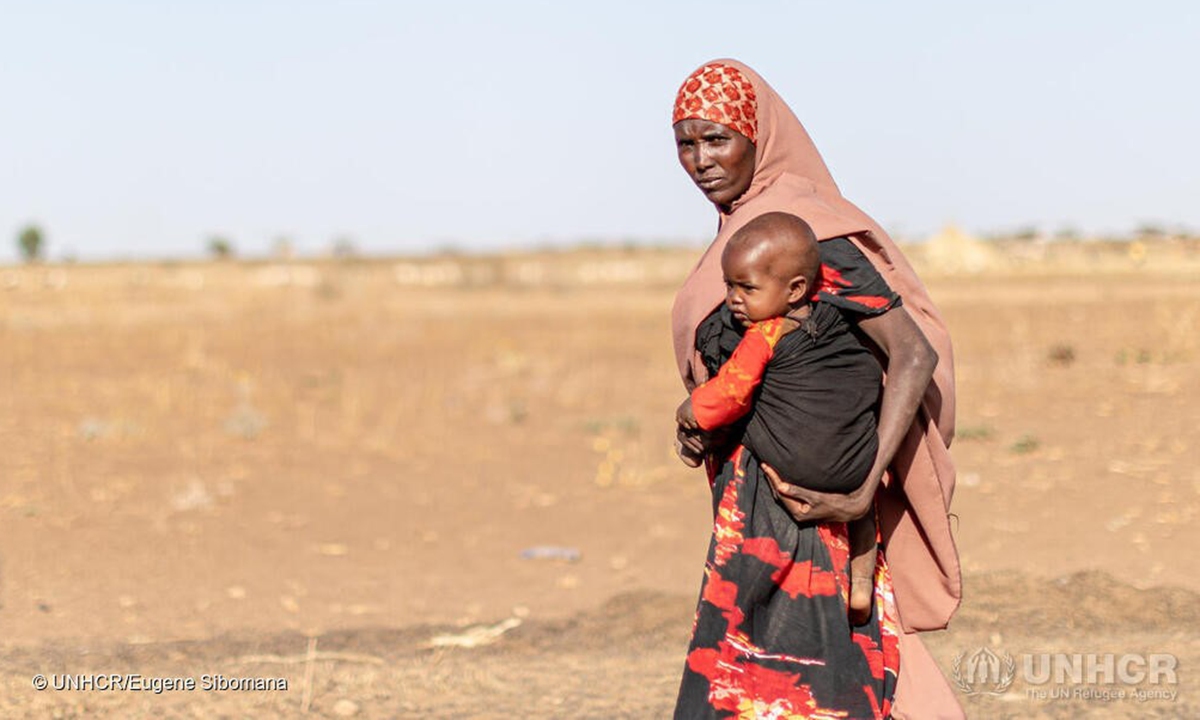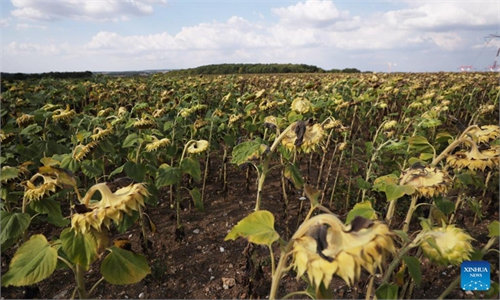West skips climate summit, helping Africa’s climate adaptation with ‘empty cheque and indifferent attitude’
Punitive restraint mechanism suggested to monitor commitments

Thousands of families have been displaced due to recent climate change and droughts in Ethiopia's Somali regions. Leaving them without hope. Most families have lost their homes, livestock, and farmland. Photo: UNHCR/Eugene Sibomana
With no Western leaders showing up at the climate summit in Rotterdam, Netherlands on Monday besides the host country, developed countries in the West responsible for most historical CO2 emissions have been slammed as being indifferent and irresponsible for dodging their moral obligation and hampering global climate cooperation, with their pledge of $25 billion funding to support climate change adaptation in African countries doubted as another empty cheque that could not be cashed.
The $25 billion was promised by the Africa Adaptation Acceleration Program, a joint initiative of the African Development Bank and the Global Center on Adaptation, the amount being the biggest ever globally, according to AP.
However, after decades of developed countries' unfulfilled funding promises, African countries remain skeptical whether this will be another empty cheque, which experts said will be most likely.
"The West's record on its promises reveals they are unlikely to be fulfilled, just like the previous lip service," Zhu Weidong, senior research fellow with the Institute of West Asian and African Studies at the Chinese Academy of Social Sciences, told the Global Times on Tuesday.
Developed countries projected that they will not meet to mobilize $100 billion a year to help poorer countries deal with climate change until 2023 - three years late and still woefully short of the real need, according to a report from the Conversation, a non-profit organization.
As for the US, its Congress earlier approved a mere $1 billion in international climate finance for 2022 - far short of Joe Biden's pledge to provide $11.4 billion a year by 2024.
"Throughout the Paris Agreement and some previous framework conventions on climate change, there are still ambiguous areas regarding the implementation details of some responsibilities and obligations of developed countries," Li Zhiqing, a professor of environmental economics and Chinese economy at Fudan University, told the Global Times on Tuesday.
The scholar suggested a punitive restraint mechanism be added. "There is currently a lack of an effective constraint on whether pledged funds are being delivered," he said. "In the Paris Agreement, there is a five-year check mechanism on the fulfillment of countries' emission reduction obligations, and such a mechanism could perhaps be extended to bind the delivery of pledged funds."
Mark Rutte, Prime Minister of Netherlands, the host country, was the only Western leader to attend the summit in person. He admitted that attendance "has not been at a level [they] would have liked."
African leaders also criticized on Monday the lack of Western counterparts at a meeting in Rotterdam with some saying wealthy countries responsible for most CO2 emissions should have been there.
"I cannot fail to note with a touch of bitterness the absence of the leaders of the industrialized world," said Senegalese President and African Union chief Macky Sall at the opening of the event, AFP reported. "Because these are the main polluters of our planet and it is they who should finance adaptation."
"Apparently, other issues facing the West itself have stolen most of their attention, such as the energy crisis and economic woes within their own continents," Zhu said.
Several European countries, including Germany, France, Italy, Spain, and the Netherlands have already returned or are planning to return to coal to generate electricity, after feeling the pinch from the energy crisis resulting from the Ukraine crisis, on top of Europe seeing its worst drought in 500 years.
The expert reminded developed countries that their carbon emissions and pollution are the cause of Africa's climate vulnerability and that they have both a moral and a practical responsibility for it.
"The African continent has the smallest impact on climate change, but paradoxically suffers the majority of its consequences," Congolese President Felix Tshisekedi said at the event on Monday, according to AFP report.
Former UN chief Ban Ki-moon added that Africa emits just 3 percent of global CO2 emissions, and there is a moral duty to help Africa adapt, the report said.
Zhu pointed out that developed countries, with their early industrialization and high carbon emissions, are in fact responsible for the deterioration of the climate in Africa, which has been struggling with drought, cyclones and extreme heat in the recent years.
"The UN and some international climate conventions have also made relevant provisions about their obligations," he said.
The Rotterdam summit is a part of the series of regional meetings ahead of the crucial COP27 climate conference which will take place from November 6 to 18 in Egypt. With only two months remaining till COP27, the insincere promises and indifferent attitude from the West are once again overshadowing the event which is designed to boost global cooperation to address climate challenges, experts said.
"It was not just the fate of Africa that is at stake, but the fate of humanity and the future of the planet," said Sall, signaling a warning to the West.
While the Western countries backpedal their pledges on climate change and even use the topic as a political tool to smear China, China has been steadily advancing toward its goal on carbon neutrality and promoting green development under the Belt and Road Initiative. The National Development and Reform Commission issued guidance in March this year, vowing to steadily advance cooperation on green infrastructure, energy, transportation and finance by 2025. By 2030, environmental risk prevention and control systems for overseas projects should be improved, according to the guidance.
Zhu Haoning also contributed to the story

